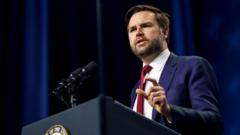JD Vance, the US Vice-President who converted to Catholicism in 2019, is set to arrive in Rome this Friday, with a significant agenda that includes meetings with Italy's Prime Minister Giorgia Meloni and the Vatican's Secretary of State, Cardinal Pietro Parolin. However, news sources indicate that Vance's primary objective may be to secure a meeting with Pope Francis, a moment that could become the highlight of his visit.
This sought-after encounter holds considerable symbolic importance, especially given the proximity to Easter, a crucial time for the Catholic faith. Such a meeting could indicate a warming of relations between the Vatican and Washington, which have been strained due to various issues including migration policy and moral leadership. The Pope has voiced strong concerns regarding deportations, asserting that such actions harm the dignity of many individuals and families.
Father Roberto Regoli, a Church historian, noted that a meeting between these two prominent Catholics—one leading the Church and the other a political figure—would hold substantial weight on the global stage. So far, neither the White House nor the Vatican has confirmed any plans for a meeting, which leaves uncertainty about the Vice-President’s aspirations.
While Pope Francis has recently re-emerged after a health scare, he has canceled many official engagements. Nonetheless, he has demonstrated his willingness to meet with world leaders, having met King Charles III and Queen Camilla just last week. Observers, including David Gibson, director of the Center on Religion and Culture at Fordham University, argue that publicizing a meeting would align with the Pope's inclusive principles, which aim to bridge divides.
Conversely, if no meeting occurs, speculation may arise regarding the implications of a possible snub or concerns about the Pope’s health. Besides his interactions with the Pope, Vance is confirmed to meet with Meloni, a key figure aligned with far-right policies in Europe, echoing the administration's tough stance on migration.
This collaboration could forge political alliances as Vance aims to address shared strategic interests in areas like tariffs and trade. However, Vance's previous statements at the Munich Security Conference, where he criticized European leaders for failing to uphold free speech and losing touch on issues like immigration, may complicate these dialogues.
The tensions also extend to the Vatican, where hardline US immigration policies have faced criticism from Church leaders, including Pope Francis, who advocates for more humane responses to migrants. Vance has recently faced scrutiny for his attempts to reconcile Catholic doctrine with administration policies perceived as harsh towards vulnerable communities.
If Vance manages to secure a meeting with the Pope, it could serve both his and the Pope’s interests, potentially reframing Vance’s public image and demonstrating the Pope's commitment to inclusivity. While Vance's late conversion to Catholicism was motivated by a desire for a moral compass amidst societal challenges, the implications of his political and spiritual engagements in Rome will be closely watched in the coming days.






















